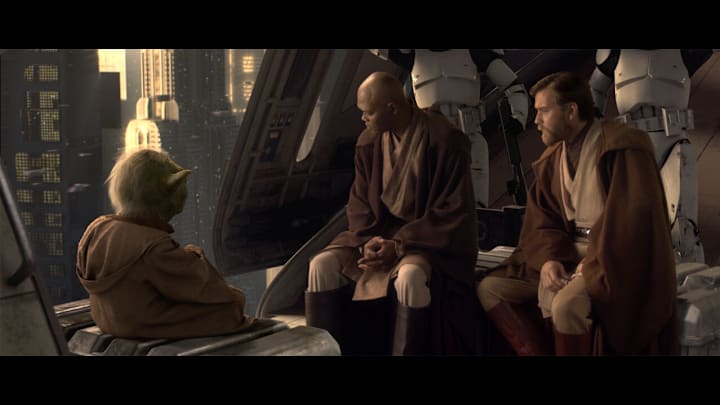He’s small, green, and speaks in riddles—but when Yoda talks, the galaxy listens.
More than just a wise Jedi Master, Yoda became the philosophical heart of Star Wars, offering wisdom that extends far beyond the screen. His words echo with spiritual weight and truth earned through hundreds of years of living and a quiet intensity that fans have carried with them for decades. Whether you’re facing Sith Lords or personal failures, Yoda’s lessons still hit home.
In this post, we’re revisiting four of his most powerful lines—not just because they’re quotable (though they are) but because they continue to shape how we think about fear, action, failure, and legacy. Let’s look closer at the wisdom of the Jedi—and why it still matters, now more than ever.
"Do or do not. There is no try."The Empire Strikes Back
Sure, what I remember most about this quote was that entering "thereisnotry" in Dark Forces II: Jedi Knight's chat feature let you skip the level. But surely there's more to this than an ironic way to move past level 9 (man, I hated that level).
Perhaps more notable, this quote launched a thousand motivational posters—and still, it’s often misunderstood.
When Yoda tells Luke to lift his X-wing from the swamp, Luke says he’ll “try.” Yoda doesn’t accept that. To him, “trying” implies doubt, a lack of full commitment. And for a Jedi facing impossible odds, doubt is deadly. It's not about perfectionism. Yoda isn’t saying failure is unacceptable—indeed, do or do not. Failure is a part of life. What he's saying is hesitation shouldn't be. The Force requires belief. Either you act with intention and clarity, or you don’t act at all.
It’s a brutal truth, especially in a culture where “trying” is often praised. But Yoda cuts through that comfort. In his view, success begins not with effort, but with conviction. In everyday life, it’s a challenge to stop hedging and start deciding. Whether it’s leaving a job, pursuing a dream, or confronting fear—do or do not. There is no try.
"Fear is the path to the dark side. Fear leads to anger, anger leads to hate, hate leads to suffering."The Phantom Menace
Sure, the quote was delivered in the middle of a Jedi Council meeting that felt more like a galactic HR seminar, but this line has teeth. Yoda doesn’t raise his voice. He doesn’t need to. It’s a quiet warning, and it echoes through the entire saga.
It’s also the moment that little-kid-me realized Yoda wasn’t just a backwards-talking gremlin—he was terrifyingly right. Even if you didn’t fully grasp the layers when The Phantom Menace first dropped, you could feel the weight behind it. It’s a warning, a prophecy, and a roadmap to self-destruction, all in one. It hits even harder knowing that for Anakin, it would ring frightfully true.
And let’s be honest—this is even more pertinent as an adult. We’ve all seen how fear spirals into rage, or how anger masks grief, or how holding onto hate just… breaks something inside. You start noticing it everywhere: in politics, online arguments, even your own relationships. Fear doesn’t just freeze us—it festers. It distorts. Yoda’s chain of corruption is more than Jedi lore or a line only applicable to the future Darth Vader. It’s an emotional truth.
Anakin ignored it. Don’t be Anakin.
"Pass on what you have learned."The Return of the Jedi
The first time I remember this line hitting was after I beat Republic Commando for the eighth time. I learned that the game is awesome and that everyone should play it.
Seriously. Go download it and give it a go.
But Yoda, of course, meant something deeper.
When he tells Luke to “pass on what you have learned” as he's dying in his hut on Dagobah. It's some of his final words, and they're not about lightsaber tricks or how to levitate rocks. It’s about wisdom. About mistakes. It’s a legacy built not on bloodline or victory, but on teaching.
And in a galaxy—or modern-day world—obsessed with power, that’s subversive. Knowledge isn’t for keeping—it’s for giving away. The Jedi don’t live on because of temples or relics. They live on because someone shares the lesson. So should we.
"The greatest teacher, failure is."The Last Jedi
Okay, let's say it, The Last Jedi divided the fandom like no other Star Wars movie. Some loved it, some… not so much. I'm in the 'not so much' crowd, though there was some beauty in that movie. But if there’s one thing Yoda reminds us through this line, it’s that failure isn’t the end of the story. It’s the start of learning.
Whether it’s a risky plot twist that didn’t land or a character arc fans debate for years, The Last Jedi taught us all something about expectations, surprises, and growth—even if it came wrapped in controversy. Yoda’s words cut through the noise: Stumbling isn’t defeat. It’s how you get better.
In a saga obsessed with heroes and villains, this quote reminds us that even the wisest Jedi had to learn from their mistakes. Maybe that’s why Yoda’s voice still rings true—because we all know failure isn’t just a plot device. It’s life.
